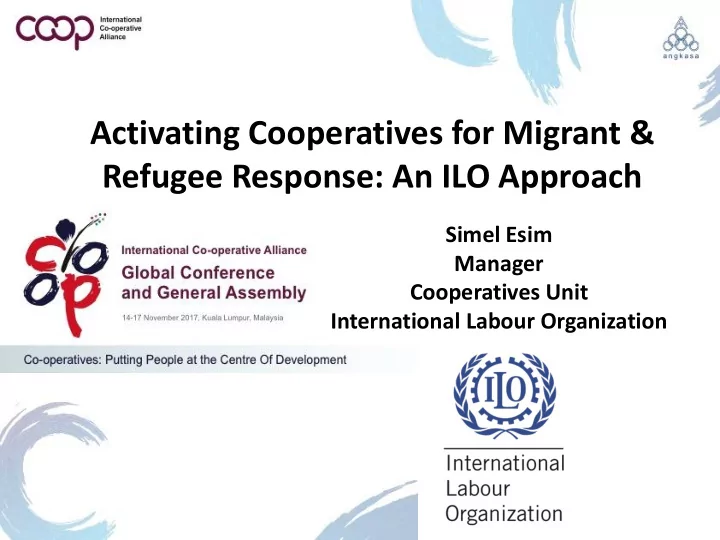

Activating Cooperatives for Migrant & Refugee Response: An ILO Approach Simel Esim Manager Cooperatives Unit International Labour Organization
Contents • Global context of migrants and refugees • Decent work challenges migrants and refugees face • ILO approach to migrants and refugees • Cooperative responses to migrants and refugees • Highlights of ILO’s work with migrants and refugees through cooperatives
Labour Migration Statistics at a Glance
Decent Work Deficits in Labour Migration • Labour migration – the movement of people from one country to another with the purpose of employment. • Most of the international migrants are migrant workers “The main economic driver of migration is the movement of people from regions of lower labour productivity to regions of higher labour productivity.” (Sachs 2016) • Migrant workers suffer from significant violations of their human rights, including fundamental rights at work and other labour rights violations that increase the social and financial costs of labour migration • Many migrant workers are found in the informal economy, including in domestic work, manufacturing, construction and agriculture
Decent Work Challenges for Refugees • Most of the world’s refugees are unable to earn sufficient income to meet their basic needs • The right and access to decent work are now seen as key contributors to building self-reliance and strengthening resilience • Access to work & livelihoods are prohibited or restricted by law for refugees • 75 out of 145 states parties to the 1951 refugee convention formally grant refugees the right to work • Even when the right to work is in place, refugees suffer from violations of labour rights (forced bonded and child labour)
ILO Approach to Labour Migration ILO has a two-fold intervention strategy: Employment and labour market interventions for jobs Protection of migrant workers and equality of treatment Mandate is to protect migrant workers; focus on migrants as workers; promote fair (equal) treatment of migrant workers Lack of jobs or poor working conditions are often at the origin of migration - goal is creation of productive employment & decent jobs for all A number binding (e.g. Conventions No. 97 & 143) & non-binding instruments, e.g. Multilateral Framework on Labour Migration – governance of labour migration & protection mechanisms
ILO Approach to Refugee Situations • Guiding principles on access of refugees & other forcibly displaced persons to the labour market adopted at the ILO in July 2016 Collaboration between ILO and UNHCR including through an • MoU signed in 2016 – e.g. value chain integration, microfinance ILO has a flagship programme on jobs for peace and resilience • with ongoing activities in Ethiopia, Ukraine, Lebanon Coordinated response to the Syrian refugee crises through the • Regional Refugee Response and Resilience Plan (3RP) Employment and Decent Work for Peace and Resilience • Recommendation, 2017 (No. 205) that was adopted in June with several references to refugees
Types of Cooperative Activities with Migrants & Refugees Social cooperatives provide integration services Producer/worker cooperatives of Job placement migrants & refugees as primary Education & enterprises Training Basic needs Service cooperatives by migrants & Type of refugees for improving their livelihood Livelihoods activities support activities undertaken Care services by Migrants & refugees become members cooperatives of existing cooperatives – taxi, domestic Market access worker Legal advice & counselling Migrants & refugees work in existing Access to finance cooperatives - agriculture, housing Return migrants & refugees can rebuild Based on the literature review “Cooperatives and Refugees”, ILO 2016 (unpublished) their communities through cooperatives
TYPES OF ORGANIZATIONS Housing coops Social coops SUPPORTING COOP DEVELOPMENT Coops providing FOR MIGRANTS & REFUGEES IN care Worker coops DESTINATION/HOST COUNTRIES Cooperatives supporting Coops providing refugees A range of organizations support the work of education Fair trade coops cooperatives with migrants & refugees. Producers coops Financial coops Governments (I)NGOs (including local) Types of organizations TYPES OF COOPERATIVES WORKING Supportive supporting coop organizations development UN System WITH MIGRANTS & REFUGEES IN (trade unions, BDS (including the ILO) etc.) DESTINATION COUNTRIES Different types of cooperatives work for migrants & Cooperative refugees, with them, and can be established by them . movement Based on the literature review “Cooperatives and Refugees”, ILO 2016 (unpublished)
Highlights of ILO’s Work with Migrants & refugees through Cooperatives Pilot cooperative activities In Ethiopia the ILO is In India and the Philippines the ILO is conducting In Jordan ILO works starting to support the participatory research on the role of cooperatives with agricultural and development and in fair recruitment of migrant workers in general multipurpose strengthening of and women workers in particular. cooperatives in cooperatives among helping refugees to return migrants from formalize their work The aim is to assess the scope for the cooperative the Gulf States and status. In the making is model to be an option for improved recruitment other Arab countries as the development of practices of migrant workers and if so to start pilot part of a larger project joint activities testing it where unscrupulous practices of labour for return migrant between Jordanian intermediaries are a major challenge to worker economic reintegration. cooperatives and rights. A number of training Syrian refugees for a packages will be solidarity brand of adapted for these agro-food and purposes. artisanal products
THANK YOU coop@ilo.org esim@ilo.org
Recommend
More recommend